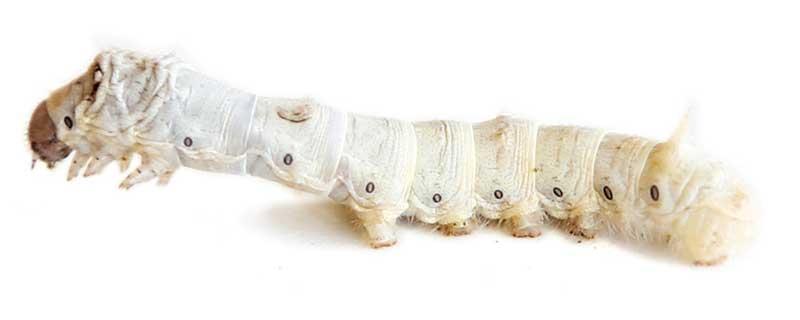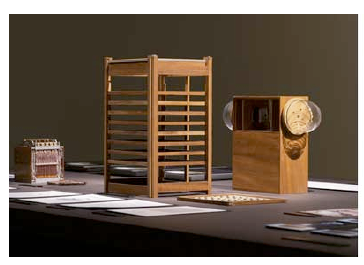Jun 8, 2019
The Silkworm Project
- 15:00 to 18:00
- Workshop
- Dept. III
- Weijing (Vivian) Xu
THE SILKWORM PROJECT Workshop will give insight into the artistic research and practice by Vivian Xu and offers a hands-on part, based on artist Vivian Xu's solo exhibition at Art Laboratory Berlin of the same name.
The Introduction
Vivan Xu will present her research and work for the past six years designing computational and machine environments for the silkworm in pursuit of better understanding the insect's spinning behaviour and spatial perception. The talk will detail three perspectives taken during the research process of The Silkworm Project. The first perspective takes a historical and cultural look at the entangled history of weaving and computation history, of sericulture and machine logic. The second attempts to understand the three-dimensional world through the lens for the silkworm. The third attempts to hypothesize a new machine logic combining learned knowledge of the two, that speculates on a new breed of slow technologies or labour machines that reveal a new relationship between the artificial and the natural. The artist will also speak about her current work at the Max Planck Institute for the History of Science, in which she will be creating an artist book that explores the nature of the sericulture treatise, and the relationships between technical treatises and industry production.
The Hands-on Part
Participants will each be given silkworms, hand-reared by the artist in Berlin. Following in the footsteps of other researchers such as the Mediated Matter Group at MIT Media Lab, individuals will be able to conduct their own spinning observations, posing spatial questions to the animals by constructing three-dimensional environments for their silkworms to live and work within. Art Laboratory Berlin will provide basic materials and tools, such as glue, scissors, paper, rulers, etc. to build these environments. Participants are also welcome to bring their own materials. Participants will be able to take their silkworms home, and some silkworm feed provided by Art Laboratory Berlin, along with online resources and manuals. Participants will be asked to document their observations and findings. These results will be shared back to Art Laboratory Berlin and will be posted to a dedicated webpage.

The Hands-on Part
Participants will each be given silkworms, hand-reared by the artist in Berlin. Following in the footsteps of other researchers such as the Mediated Matter Group at MIT Media Lab, individuals will be able to conduct their own spinning observations, posing spatial questions to the animals by constructing three-dimensional environments for their silkworms to live and work within. Art Laboratory Berlin will provide basic materials and tools, such as glue, scissors, paper, rulers, etc. to build these environments. Participants are also welcome to bring their own materials. Participants will be able to take their silkworms home, and some silkworm feed provided by Art Laboratory Berlin, along with online resources and manuals. Participants will be asked to document their observations and findings. These results will be shared back to Art Laboratory Berlin and will be posted to a dedicated webpage.

Silkworms. Photo: Vivian Xu.
Contact and Registration
Please register for this event by emailing register@artlaboratory-berlin.org.
About Vivian Xu
Vivian Xu is a media artist and researcher from Beijing, currently based in Shanghai. In 2013, she received her MFA in Design and Technology at Parsons the New School for Design. She is an independent artist. Her work explores the boundaries between bio and electronic media in creating new forms of machine logic, life and sensory systems, and often take the form of object, installation and/or wearable. She has shown, lectured, and performed at various institutions in China, the US, Germany, and Australia, including the National Art Museum of China (Beijing), the Central Academy of Fine Art (Beijing), the China Academy of Art (Hangzhou), the Chronus Art Center (Shanghai), the Rockbund Museum (Shanghai), the Shanghai Symphony Orchestra (Shanghai), the New York Science Museum (New York), Gallery Ho (New York), Art Laboratory Berlin (Berlin), and SymbioticA at University of Western Australia (Perth). Vivian co-founded Dogma Lab, a trans-disciplinary design lab in Shanghai that is dedicated to creating experimental research at the intersection of design, technology, art and science. As an artist-in-residence at the Max Planck Institute for the History of Science (May-Aug. 2019), Vivian develops an artist book of her bio machine art series The Silkworm Project. This work will be presented at Art Laboratory Berlin.
About the Series
Art Laboratory Berlin and the Max Planck Institute for the History of Science (MPIWG) collaborate together through a four-month research stay in Berlin by Vivian Xu. Between May and August 2019, Vivian Xu will pursue her artistic research at MPIWG and ALB. The exhibition and a workshop on sericulture by Vivian Xu will provide the public with insights into this fascinating long-term project.
